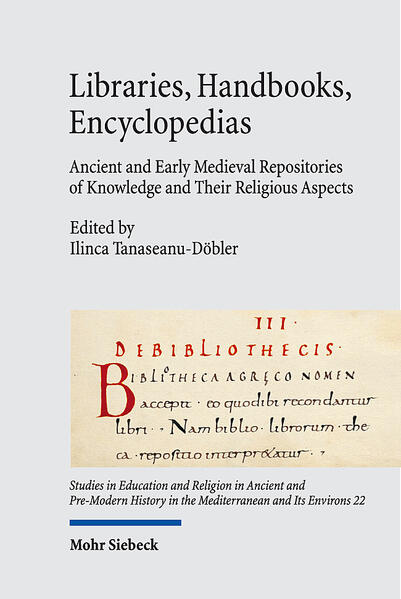
Zustellung: Do, 19.12. - Sa, 28.12.
Versand in 6 Wochen
VersandkostenfreiBestellen & in Filiale abholen:
Libraries, handbooks, and encyclopaedias collect, arrange, and present books, texts, and/or information. This is reflected not least in the polysemy of the term 'library' (beta beta th , bibliotheca ) in Roman and later times: it can denote public institutions functioning in representative architectural spaces, physical book collections, but also collections of texts, regardless of the actual physical books that contain them, and even works that condense whole physical libraries into new texts. The present volume explores this range of knowledge repositories from physical spaces and objects to the virtual level of texts by enquiring into their religious connotations, functions, and contents. How can we interpret the spatial integration of libraries into sanctuaries or monasteries? How do religious conceptions of education shape the perception of knowledge, books, and libraries? What roles do knowledge repositories play in projects of religious or spiritual formation? By asking these questions for selected case studies, the contributors highlight crucial aspects of the interplay between learning and religion from Hellenistic to Carolingian times and offer a more nuanced understanding of how religion works in ancient and medieval contexts.
Mehr aus dieser Reihe
Produktdetails
Erscheinungsdatum
11. Oktober 2024
Sprache
englisch
Seitenanzahl
347
Reihe
SERAPHIM
Herausgegeben von
Ilinca Tanaseanu-Döbler
Verlag/Hersteller
Produktart
gebunden
Gewicht
656 g
Größe (L/B/H)
22/160/235 mm
ISBN
9783161633133
Entdecken Sie mehr
Bewertungen
0 Bewertungen
Es wurden noch keine Bewertungen abgegeben. Schreiben Sie die erste Bewertung zu "Libraries, Handbooks, Encyclopedias" und helfen Sie damit anderen bei der Kaufentscheidung.













